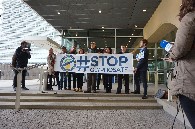Two days before EU members states are expected to vote on whether to renew the licence for the controversial weedkiller glyphosate, representatives of the Stop Glyphosate European Citizens’ Initiative have met the European commissioner for health and food safety Vytenis Andriukaitis.
Over one million people across Europe have demanded a ban on glyphosate, an overall reduction in pesticide use, and more transparency and independence in assessments of the risks posed by pesticides.
Jorgo Riss, Greenpeace EU director, said: “The glyphosate debacle has shown that the Commission continues to put the short-term interests of chemical companies before people’s health and the environment. Its failure to act on the concerns voiced by independent scientists, parliamentarians and over a million Europeans is a disgrace. Scientific research and the experience of thousands of organic farmers show that pesticides and glyphosate are not necessary. To help restore faith in the EU, the Commission must set a path to phase out dangerous pesticides and ensure healthy food and environmentally friendly farming.”
Background
The stopglyphosate.org petition is the fastest-ever ECI to succeed, with over one million signatures collected across Europe in five months, between February and July 2017. Under EU treaty rules, the Commission is required to meet the organisers of the pan-European initiative, while the European Parliament must hold a formal hearing.
The EU licence for glyphosate runs out on 15 December 2017. The European Commission has proposed renewing EU approval for another ten years, based on European Food Safety Authority (EFSA) and European Chemicals Agency (ECHA) evaluations. The World Health Organisation’s cancer experts have said glyphosate causes cancer in animals and is a probable cause of cancer in humans.
Serious concerns have been raised about the influence glyphosate manufacturers may have had on the EU’s evaluation of the risks linked to glyphosate. EFSA has come under fire after it was revealed that large sections of its glyphosate assessment rejecting independent scientific evidence werecopied from an application submitted by Monsanto.
Four countries (France, Italy, Austria and Luxembourg) have said they will vote against the Commission’s proposal, and others such as Germany are expected to abstain. The European Parliament is expected to pass aresolution demanding a phase out of glyphosate.
Eight countries (France, Italy and Luxembourg, supported by Germany, Netherlands, Sweden, Denmark and Slovakia) have also called on the Commission to initiate a debate on a “more transparent, more effective and safer assessment of chemical substances”. France also has a national plan to reduce pesticide use over the coming years.
Note: For more information on the glyphosate decision-making process, please refer to this timeline.
Contacts:
David Schwartz – ECI Coordinator, WeMove.EU: +32 (0)486 078342, [email protected]
Mark Breddy – Head of communications, Greenpeace EU: +32 (0)496 156229, [email protected]

